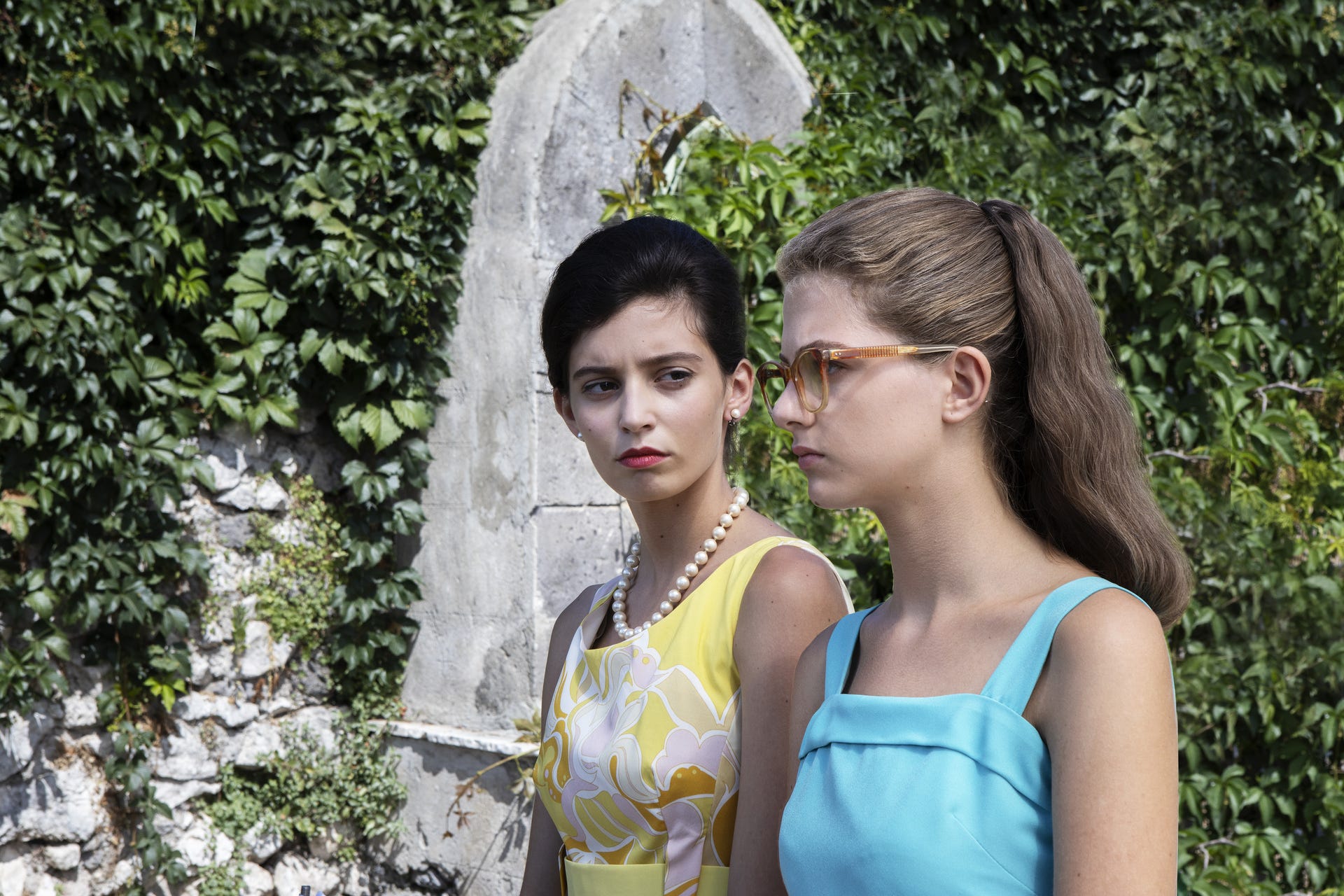
Why ‘My Brilliant Friend’ Resonates Beyond Italy
It offers a universal—and sometimes painfully candid—portrait of female friendship and competition.

HOW IS IT THAT a person (me) born and raised in America could respond so viscerally to My Brilliant Friend, an Italian drama series (which recently wrapped its final season on HBO and streaming on Max) about the tortuous, lifelong relationship between two women raised in a suburb of Naples? We are all motivated by similar impulses: love, jealousy, hunger, hatred, success, and most of all, survival. Using Elena Ferrante’s quartet of Neapolitan novels as source material—and following them almost to the letter—creator Saverio Costanzo transforms an intensely personal saga into a universal story.
The series follows the friendship between Elena “Lenú” Greco and Raphaella “Lila” Cerullo (both played by multiple actresses) from their childhood in the 1950s through their old age in the 2010s. Lenú is fair-haired, studious, and observant. Lila is dark, wild, and impetuous. But both are drawn to each other because of their deep intelligence and imagination. Lenú marvels at Lila’s savagery and complete disregard for provincial mores, and Lila is attracted to Lenú’s reserve and grace.
Although Naples is a train stop away, Lenú and Lila’s hometown holds none of its cultural treasures. The girls share and endlessly reread a dog-eared copy of Little Women, the town square is a dirt patch, and the individual fortunes of its citizens are controlled by two rival Camorra-adjacent families—the Carraccis and the Solaras—who rule the suburb through fear and intimidation. Considering their deprivation, the fact that an adult, Donato Sarratore, who works for the railway but also writes poetry, is able to move his family into the city proper seems like a beautiful but improbable dream to both girls. That fantasy of intellect triumphing over poverty and provincialism feeds into Lenú’s decades-long love for Sarratore’s handsome, reticent, bookish son, Nino.
The girls’ way out is education. But this is where their paths diverge. An elementary school teacher marvels at their fierce intellect and advocates for both to go to middle school, something very few children from the neighborhood manage to do. She convinces Lenú’s family, but not Lila’s. Lila works in her brutal father’s cobbler shop and then gets married at sixteen to one of the Carraccis to escape her family, while Lenú travels into the city of Naples and excels in her studies.
This is where the rivalry between Lenú and Lila truly begins. While on one level she understands Lenú’s need to leave town to continue her education, Lila also resents that she doesn’t have a similar opportunity. So she continually draws Lenú close (at one point, Lila, who has married into money, buys Lenú the books she’ll need but cannot afford to continue her education), and then pushes her away (Lila then calls Lenú pretentious for speaking proper Italian instead of the Neapolitan dialect). Lila tells Lenú she must succeed for the both of them, but then taunts her when Lenú achieves just that. It’s the underlying reason Lila has an affair with the intellectual Nino one summer in their twenties, even though she knows Lenú pines for him. Not only can she mine his academic brain, she can punish Lenú for leaving her behind.
Lila is Lenú’s id, and Lenú is Lila’s superego, but neither knows how to communicate and bond in a healthy way. They care intensely and depend on the other to the point of obsession, but they also sometimes behave terribly toward each other and those closest to them. Lenú is addicted to their mercurial friendship, and compares herself relentlessly to Lila’s fierce power and beauty, always finding herself lacking. Even though she excels in school and others describe her as exceptional, who is the real brilliant friend? Lenú believes Lila, though uneducated, has the innate brilliance that escapes her. She convinces herself she would be ordinary without Lila’s influence. Even when she becomes a successful writer, Lenú feels insecure and indebted to Lila because all her books are inspired by Lila’s life. Lila is alternately cruel or affectionate depending on her moods and needs, and Lenú suppresses her anger, sometimes distancing herself from Lila, but usually being a passive, dutiful friend while secretly wishing her ill. And then when misfortunes befall Lila, Lenú feels immeasurably guilty, as if she conjured them into reality.
I HAVE RARELY SEEN a female friendship depicted on film with such unvarnished honesty and nuance. It doesn’t matter if you live in an Italian village in the 1950s or present-day America, every woman I know has had similarly complicated feelings about a close female friend. We still live in a patriarchal society where we are taught that in order to be “nice,” we should suppress our desires. And because opportunities are more limited for women than they are for men, and finding the “right” husband is a female goal, we are trained from an early age to be each other’s rivals. We are tacitly told that there is only so much good fortune to go around and if one woman has it, it depletes another’s, that happiness is a zero-sum game. Because Lila is charismatic and scorns small-town thinking, the girls she grows up with feel threatened. They are jealous when Lila becomes prosperous, and smug when her fortune plummets. And Lenú’s female teachers and mentors are supportive when they view her as dependent, but become hostile when they perceive their young ward is surpassing them in status and influence.
Lila’s ferocity is compelling but frightening to Lenú because that impulse burns secretly inside her too. Lenú becomes a published author and a respectable, bourgeois wife through politeness and obedience. Everyone compliments her “goodness,” and it’s what has afforded her success at school and in life, marrying into an elite, intellectual family. However, because she tamps down her needs in order to appear unselfish and faithful, and has developed herself exclusively through words while pushing away her feelings, she inevitably blows up her marriage by leaving her family for the insatiable Nino.
Lenú and Lila’s complicated relationship with motherhood is also relatable. Lila wants nothing more than to devote all her energy to raising her son but is forced to work a factory job to survive. Her son is affected emotionally, and she feels culpable for his future shortcomings. After publishing her first novel, Lenú, though attentive to her children and workaholic husband, is isolated, exhausted and lonely in motherhood. She feels thwarted in her ambitions, angry at her husband, and longs for intellectual and social stimuli.
I felt both women’s predicaments intensely. Whether working or not working, mothers then and now are pulled apart psychologically, never feeling adequately committed to either their desires for personal fulfillment or their responsibilities to their families.
Even though I winced at some of Lila’s and Lenú’s actions and hoped they would make better decisions, I recognized the truthfulness of their behavior. More painfully, I recognized my own flawed behavior in them. As a woman, I have fallen into the trap of equating goodness with niceness, being a passive people-pleaser rather than being honest and direct with myself and others about what I really needed, exacerbating my own resentment. And like Lila and Lenú, I have been so caught up in the fantasy of certain men, what they represent rather than who they actually are, that I have sacrificed myself and what I know to be right to satisfy them. When I saw the way Nino charmed and wheedled his way into Lila’s and Lenú’s hearts because he needed to be wanted by as many women as possible to feel alive, I recognized with a shock that I am embarrassingly familiar with that kind of man.
Within an intimately personal story about two specific girls moving through life, My Brilliant Friend excavates so many universal themes: the limits of feminism, the extent of generational trauma, how youthful idealism transitions into middle-age compromise, the toxicity of capitalism, the conflict between intellect and common sense, and the virulence of violence. Even if I never step foot in that Neapolitan suburb, I’ll feel a lifelong connection to Lila, Lenú, and all the other characters I watched for four seasons. I empathize with their struggles, I recognize their failings and their successes, and I understand what motivates them, because it’s what motivates me and people I know. If I judge them, I am also judging myself. We can’t always be ideal sisters to each other like the girls Lenú and Lila adore in Little Women, but My Brilliant Friend allows me to acknowledge my shortcomings and hopefully become more straightforward, honest, and true to myself so I can be a better friend to women in my own life.


















